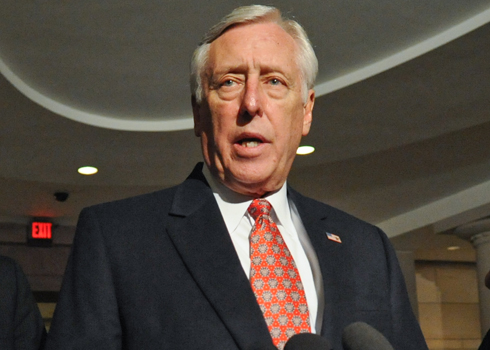Contrary to popular belief, Democrats can take care of the nation’s debt problems, House Majority Leader Steny Hoyer told a room of wonks in D.C. this morning. Staring down the barrel of an increasingly dissolutioned electorate fired up about government spending, the national debt and the deficit, Hoyer said that everything — including defense spending and raising the retirement age — is on the table when it comes taking on the nation’s fiscal health.
The speech included a dire warning about the future unless something is done about how the nation operates — and some of the rhetoric sounded like it might easily have come from some of the Democratic party’s harshest critics on the right, who have warned of a Greece-style meltdown if something isn’t done about spending soon.
“More than ever, Americans understand the danger of debt: a stagnant economy, a hobbled government, and a weak national defense,” Hoyer said in prepared remarks distributed to reporters at the event. “More than ever, it’s possible to imagine a government with nothing left to spend on educating our children, on securing our borders, on conducting groundbreaking research. More than ever, it’s possible to imagine a government of, by, and for interest payments and entitlements.”
Hoyer’s solution? Attack the “long-term” problem — and tip some sacred cows.
“Unfortunately, we can blame our long-term deficit on policies that are almost universally popular,” he said. “We’re lying to ourselves and our children if we say we can maintain our current levels of entitlement spending, defense spending, and taxation without bankrupting our country.”
Rather than bicker about short-term spending issues, Hoyer said leaders in Washington should come together to make “structural changes” to how the government handles its money. That includes making tough choices on the spending side, he said, but also potentially unpopular decisions on the revenue side as well. Republicans, he said, are not ready to take up that part of the argument. Hoyer called out the GOP for refusing to consider the fiscally-responsible moves of some of of their icons in all their current fiery rhetoric about spending and the deficit.
“Conservative economics used to be in touch with fiscal reality,” Hoyer said. “Remember that even President Reagan raised taxes in 1982, 1983, and 1984. Today, Ronald Reagan would be kicked out of the Republican Party.”
“He and Bob Bennett would have a partnership,” Hoyer joked, referring to the Utah Senator removed earlier this year by conservative partisans in his home state upset over Bennett’s vote for TARP, among other things.
Hoyer said in the speech that Republicans have made the case for him that increased revenue must be part of a fiscally-responsible budget policy.
“Why am I so sure that a spending-and-revenue compromise is the only plan that has a chance of succeeding?” he said. “Because a spending-only plan has been on the table for more than two years.”
Hoyer said the GOP has ignored the budget plan offered by Rep. Paul Ryan (R-WI) despite the fact that it does exactly what the party says it wants to do — achieve a balanced budget without raising taxes.
“But what have we heard from his own party? Crickets,” Hoyer said. “For two years, the Republican Party has run away from Paul Ryan’s plan, even though you’d expect it to rush to embrace a proposal based on spending cuts.”
But Hoyer might his own problems getting his party to embrace the roadmap he laid out today. Along with calling for a look at increased revenue, Hoyer essentially jumped from one political third rail to the next when describing the lengths to which the government will have to go to balance its books in the long term.
“On the spending side, we could and should consider a higher retirement age, or one pegged to lifespan; more progressive Social Security and Medicare benefits; and a stronger safety net for the Americans who need it most,” he said. After the speech, Hoyer clarified his comments about entitlements, saying that “we need to make sure those most in need are protected.”
Defense cuts, another tough sell on the campaign trail in the past, is also on Hoyer’s radar.
“Any conversation about the deficit that leaves out defense spending is seriously flawed before it begins,” Hoyer said.
Hoyer argued against extending the Bush tax cuts on the wealthy, long a thorn in the side of progressives. But he also said that tax cuts for lower-income Americans might go on the chopping block in the name of fiscal responsibility.
“We need to have a serious discussion about their implications for our fiscal outlook, including whether we can afford to permanently extend them before we have a real plan for long-term deficit reduction,” he said, referring to the Bush cuts. “At a minimum, the House will not extend the tax cuts benefiting taxpayers of incomes above $250,000.”
Perhaps acknowledging the political difficulty of having a floor debate on just about any of this in the middle of an election year, Hoyer said a new House budget that he said will take on the long-term problems won’t come until after the election is over. He pegged the bill to future recommendations of President Obama’s bipartisan debt commission.
“It isn’t possible to debate and pass a realistic, long-term budget until we’ve considered the bipartisan commission’s deficit-reduction plan, which is expected in December,” Hoyer said. “I believe that Congress must take up and vote on that plan.”






